|
|
|
Sort Order |
|
|
|
Items / Page
|
|
|
|
|
|
|
| Srl | Item |
| 1 |
ID:
093293
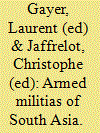

|
|
|
|
|
| Publication |
New Delhi, foundation Books, 2009.
|
| Description |
xiv, 276p.
|
| Standard Number |
9781850659778
|
|
|
|
|
|
|
|
|
|
|
|
Copies: C:2/I:0,R:0,Q:0
Circulation
| Accession# | Call# | Current Location | Status | Policy | Location |
| 054664 | 303.620954/GAY 054664 | Main | On Shelf | General | |
| 055986 | 303.620954/GAY 055986 | Main | On Shelf | General | |
|
|
|
|
| 2 |
ID:
049657
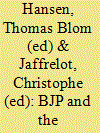

|
|
|
|
|
| Publication |
DelhI, Oxford University Press, 1998.
|
| Description |
viii, 332p.
|
| Standard Number |
019564638X
|
|
|
|
|
|
|
|
|
|
|
|
Copies: C:1/I:0,R:0,Q:0
Circulation
| Accession# | Call# | Current Location | Status | Policy | Location |
| 040303 | 324.254/HAN 040303 | Main | On Shelf | General | |
|
|
|
|
| 3 |
ID:
173326


|
|
|
|
|
| Summary/Abstract |
Five aspects of the BJP's election campaign contributed to its success in 2019. The first is the personal appeal of the prime minister, which again played a major role, like it did in 2014, as Narendra Modi led a hyper-personalized campaign. Second, this campaign focused on security-related themes which were especially relevant in the context of the India-Pakistan tensions. Third, the BJP campaign strategy was backed by the most formidable election campaign machinery assembled by any party in India since Independence. Fourth, the BJP saturated the public space with the prime minister's image, adroitly using the traditional mainstream media as well as social media. The party used religious appeal to address its core base of supporters while projecting the prime minister's image as a protector and sentinel. Fifth, the latter three aspects of the BJP's campaign were fuelled by unprecedented levels of campaign expenditure and by the opacity of political funding in India, which the BJP had made more impenetrable through the introduction of electoral bonds. The combination of these factors show that the 2019 elections were not business as usual; their singularity largely due to the decline of institutions regulating the electoral process, including the Election Commission of India.
|
|
|
|
|
|
|
|
|
|
|
|
|
|
|
|
| 4 |
ID:
165241
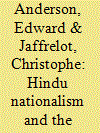

|
|
|
|
|
| Summary/Abstract |
This in-depth interview with Professor Christophe Jaffrelot – one of the world’s most distinguished, prolific, and versatile scholars of contemporary South Asia – focuses on his first area of expertise: Hindutva and the Hindu nationalist movement. In conversation with Dr Edward Anderson, Jaffrelot considers the development of Hindutva in India up to the present day, in particular scrutinising ways in which it has evolved over the past three decades. The discussion explores the diversity of Hindu nationalism and how the movement and ideology have spread beyond the purview of the RSS into various new spaces and normalised, vernacular expressions of ‘neo-Hindutva’. The interview also reflects on recent tensions involving vigilantism and the banalisation of Islamophobia and anti-Dalit violence, and considers what Hindutva’s current proliferation will mean for the future of Indian democracy.
|
|
|
|
|
|
|
|
|
|
|
|
|
|
|
|
| 5 |
ID:
086732
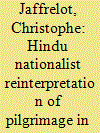

|
|
|
|
|
| Publication |
2009.
|
| Summary/Abstract |
Victor Turner's anthropological reading of pilgrimages in terms of communitas is of utmost relevance in the case of Hinduism: indeed, Hindu pilgrimages produce a relative and temporal obliteration of social cleavages - particularly caste divisions - allowing the emergence of a sense of group belonging. Moreover, the geography of pilgrimage sites maps out the sacred land, marking the area of extension of Hindu civilisation in space. Hindu nationalists have tried to exploit this particular alchemy to offer an ethnic definition of the nation (and its territory) and thereby gather a following by lending some of their demonstrations the appearance of a pilgrimage. This approach asserted itself in the early 1980s thanks to the Ekatmata Yatra (Unity March) in 1983, and was confirmed in 1990 during the Rath Yatra (Chariot festival). Nevertheless, the instrumentalist interpretation of such movements comes up against an issue that is already at the core of subaltern studies' historiography, i.e. that masses do not always mobilise for the reasons put forth by political leaders. More specifically, if women march massively in the streets during these Yatra pilgrimages, it is both because they feel concerned by the reason for demonstrations and because these demonstrations have legitimised their entry into the public space, which still remains relatively closed to them.
|
|
|
|
|
|
|
|
|
|
|
|
|
|
|
|
| 6 |
ID:
073435
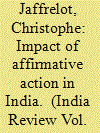

|
|
|
| 7 |
ID:
145450
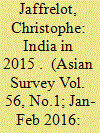

|
|
|
|
|
| Summary/Abstract |
While India’s ruling Bharatiya Janata Party lost elections in Delhi and Bihar, and its government failed to implement any significant reform in 2015, the economy was slowly recovering and Prime Minister Narendra Modi conducted an active foreign policy.
|
|
|
|
|
|
|
|
|
|
|
|
|
|
|
|
| 8 |
ID:
152239
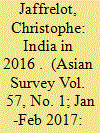

|
|
|
|
|
| Summary/Abstract |
By the midpoint of his term, Prime Minister Narendra Modi could point to some achievements on the economic front, but jobless growth remained the order of the day in India in 2016. While the BJP was more successful in the state elections than it had been in 2015, it still registered some setbacks because of the judiciary, especially because of the government’s use of President’s Rule. The year also saw increasingly conflictual relations in Kashmir.
|
|
|
|
|
|
|
|
|
|
|
|
|
|
|
|
| 9 |
ID:
022616
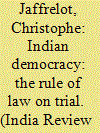

|
|
|
|
|
| Publication |
Jan 2002.
|
| Description |
77-121
|
| Summary/Abstract |
The unprecedented rise of corruption and the criminalization of politics in India are a threat to her democratic regime. This development is not due to the personality of the key figures of post-independence India, but stems from socioeconomic and political conditions: the "licence raj" led businessmen to bribe bureaucrats and politicians to get their projects cleared; its dismantlement under Delhi's economic liberalization policy generates even more corruption since the Indian economy offers more revenue-making opportunities. Besides the impact of these changing economic structures, the rising cost of elections under an ever competitive policy increases the politicians' search for money. However, the rule of law still has defenders. India has a robust judiciary and a virtually independent Election Commission. The "judicial activism" on which the former embarked in the 1990s has certainly made some impact. The Election Commission has also seriously pursued its role of protecting the public scene from the gangrene of crime.
|
|
|
|
|
|
|
|
|
|
|
|
|
|
|
|
| 10 |
ID:
055676
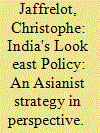

|
|
|
|
|
| Publication |
2003.
|
| Summary/Abstract |
Indian nationalist leaders developed a strong interest in Asia right from the early nineteenth century. Jawarharlal Nehru articulated an Asianist ideology based on the cultural affinities between India and China and the geopolitical interest in Greater India. This approach, which culminated in the Bandung summit, was put into parenthesis after the 1962 war. The Cold War, during which India and South East Asia were in different camps, prompted differing paths towards in emulating the economic progress of Japan, Taiwan and South Korea, and different approaches towards the development of the ASEAN. India's Asianist policy met an uneven fate but, by and large, there has been a significant rapprochement between India and East Asia. This move materialized in the investments of several Asian countries - including South Korea - in India and the entry of India in the ARF. Yet, the symbiosis between India and Southeast Asia remains hindered by the rather nationalistic view of the latter region that the Hindutva movement is still propagating: like in the colonial period, Asianism remains part of an instrumentalist strategy.
|
|
|
|
|
|
|
|
|
|
|
|
|
|
|
|
| 11 |
ID:
139627
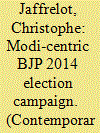

|
|
|
|
|
| Summary/Abstract |
The 2014 election campaign of the BJP was unprecedented not only because, for the first time, a Chief Minister was the prime ministerial candidate of one of the national parties in the fray and tried to promote his state achievements in terms of development across the nation, but also because the party relied on the personality of its leader more than any other party since the Congress under Indira Gandhi. Narendra Modi broke with the BJP's collegial tradition in several ways. He marginalised party veterans, short circuited the BJP apparatus to use a parallel support structure, and resorted to new techniques of communication that saturated the public space. However, these innovations were superimposed on older themes which had sometimes not been used by the BJP itself before, but by others – like caste politics or corruption. Modi's BJP also fell back on some alliances with other parties, the old RSS network, and revisited Hindutva politics to such an extent that ‘development' was definitely not the only theme of the Modi campaign.
|
|
|
|
|
|
|
|
|
|
|
|
|
|
|
|
| 12 |
ID:
119560
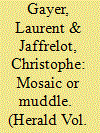

|
|
|
| 13 |
ID:
145492
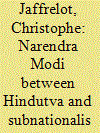

|
|
|
|
|
| Summary/Abstract |
After the 2002 pogrom, Narendra Modi, the Chief Minister of Gujarat, shifted his political repertoire from that of a Hindu Hriday Samrat (King of Hindus’ heart) to that of development and Gujaratiness. He claimed that he was a development man (Vikas Purush) and that he represented the 60 million Gujaratis as an aam admi (common man). He projected himself as an embodiment of their identity—asmita. This populist repertoire, which was explicitly articulated during the Sadbhavna mission in 2012, is in tune with the general trend of Indian politics where most of the Chief Ministers claim to epitomize one subnationalism. In the case of Narendra Modi, however, this regional identity was defined in religious terms and reflected a banalization of Hindutva, an original process that was more likely to happen in Gujarat because of the traditional definition of the state’s identity.
|
|
|
|
|
|
|
|
|
|
|
|
|
|
|
|
| 14 |
ID:
173325
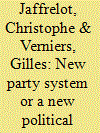

|
|
|
|
|
| Summary/Abstract |
Defying many odds, the BJP has held on to the political space it conquered five years ago and succeeded in expanding its territorial imprint. It did so through a campaign that was substantially different from the 2014 General Election campaign, which was marked by the rejection of the Congress and an enthusiastic embrace of the BJP’s promise of development for all. Five years later, much has changed in India with regard to the political system, which has become more centralized and less liberal. Since the 2019 election, the second Modi-led government has pushed the transition from a de facto Hindu majoritarian state towards a de jure Hindu majoritarian state through the adoption of controversial policies affecting some of the basic normative tenets of India’s old constitutional order, so much so that the BJP’s rise to power has transformed not only the party system, but also the political system itself. This is reflected in India dropping several ranks in most indices of democracy. At the same time, Indian national and state politics have followed divergent paths: the BJP dominates the national stage unchallenged by any rival, but is finding it increasingly difficult to sustain its sway in state elections – leaving the question of the Hindu nationalist hegemony open.
|
|
|
|
|
|
|
|
|
|
|
|
|
|
|
|
| 15 |
ID:
052046


|
|
|
|
|
| Publication |
DelhI, Manohar Publicatuion, 2002.
|
| Description |
352p.
|
| Standard Number |
1842771167
|
|
|
|
|
|
|
|
|
|
|
|
Copies: C:2/I:0,R:0,Q:0
Circulation
| Accession# | Call# | Current Location | Status | Policy | Location |
| 045722 | 305.80095491/JAF 045722 | Main | On Shelf | General | |
| 045723 | 305.80095491/JAF 045723 | Main | On Shelf | General | |
|
|
|
|
| 16 |
ID:
138716
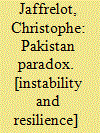

|
|
|
|
|
| Publication |
Gurgaon, Randon House Publishers India Pvt Ltd, 2015.
|
| Description |
xii, 670p.Hbk
|
| Standard Number |
9788184005745
|
|
|
|
|
|
|
|
|
|
|
|
Copies: C:1/I:0,R:0,Q:0
Circulation
| Accession# | Call# | Current Location | Status | Policy | Location |
| 058209 | 320.95491/JAF 058209 | Main | On Shelf | General | |
|
|
|
|
| 17 |
ID:
173331
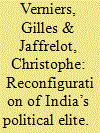

|
|
|
|
|
| Summary/Abstract |
The rise of the BJP in national and state politics is often associated with a representation skewed toward traditional elite groups and the marginalisation of groups associated with other parties, such as minorities and various dominant OBC groups. This article examines the transformation of the sociological composition of the Lok Sabha over time and seeks to assess its elitist character, by providing descriptive statistics on five socio-demographic and economic variables: caste, religion, gender, dynasticism, wealth and occupation. Data suggests that political representation in India has by and large always been skewed toward the elites, but the composition of these elites has changed over time. For instance, the recent surge in the representation of the upper caste in the Lok Sabha pre-dates the rise of the BJP in 2014, and the marginalisation of minorities and women is a long-standing phenomenon. Since 2014 however, the BJP has contributed to enhancing a particular form of elite – those rooted in local and regional business networks.
|
|
|
|
|
|
|
|
|
|
|
|
|
|
|
|
| 18 |
ID:
103823


|
|
|
|
|
| Publication |
DelhI, Primus Books, 2010.
|
| Description |
xxxii, 802p.
|
| Standard Number |
9789380607047, hbk
|
|
|
|
|
|
|
|
|
|
|
|
Copies: C:1/I:0,R:0,Q:0
Circulation
| Accession# | Call# | Current Location | Status | Policy | Location |
| 055945 | 321.80954/JAF 055945 | Main | On Shelf | General | |
|
|
|
|
| 19 |
ID:
078738


|
|
|
|
|
| Publication |
2007.
|
| Summary/Abstract |
Long-distance nationalism," an expression coined by Benedict Anderson, is often used to refer to transnational political activities, but the dynamics of this expatriate nationalism tend to be neglected. Mere nostalgia or even spontaneous mobilizations are invoked to explain this phenomenon, but fail to explain the mechanisms that lie behind it. Using the example of Hindu nationalist movements, this paper seeks to highlight the implications of political entrepreneurs in the country of origin and the instrumental dimension of long-distance nationalism. The Sangh Parivar, a network of nationalist Hindu organizations, was replicated among the Hindu diaspora and its structure was literally exported by a centralized body located in India itself. The spread of the Sangh Parivar and of its Hindutva ideology abroad was greatly facilitated by local policies like multiculturalism and by the rise of racism in the countries of emigration. A comparison of Hindu nationalist outlets in the United Kingdom, the United States, and Canada brings to light two main factors instilling long-distance nationalism: a favorable local context for ethnic mobilization among migrants and a centralized organization in the country of origin. The engineering of long-distance Hindu nationalism from India questions the changing nature of nationalism in a globalized world.
|
|
|
|
|
|
|
|
|
|
|
|
|
|
|
|
| 20 |
ID:
131780
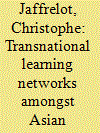

|
|
|
|
|
| Publication |
2014.
|
| Summary/Abstract |
The students of transnational flows, including James Rosenau,1 have pertinently highlighted the growing assertion of 'sovereign free actors' at the expense of 'sovereign bound actors' in what they call postinternational politics.2 Dealing mostly with the end of the Cold War era, they have tended to focus on the increasingly important role of not only the multinational firms but also of the financial companies on newly globalized markets, and not only law-abiding but also illicit traffickers (of drugs, arms etc.) which have prospered along with increasingly more effective means of communication.
They have almost completely ignored the transnationalization of religions, except from the point of view of fundamentalisms and related terrorist networks. Sociologists have paid more attention to this development.3 But these studies, which have mostly focused on the impact of migrations,4 have tended to under estimate the resilience of state boundaries5 and have often neglected the circulation of ideas, especially from the point of view of the learning networks-the very object of this Special Issue which concentrates on one particular creed: Islam.
|
|
|
|
|
|
|
|
|
|
|
|
|
|
|
|
|
|
|
|
|